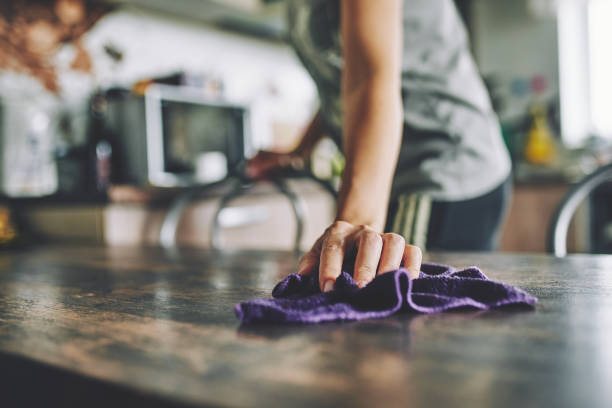Cooking can be a delightful experience, but the aftermath in the kitchen is often less so. Dealing with spills, stains, and clutter post-cooking is a task many dread. However, with some smart and easy cleaning hacks, you can significantly cut down on the time and effort spent on post-cooking cleanup. This comprehensive guide will walk you through efficient strategies to keep your kitchen spotless and make the cleaning process quicker and more manageable.
Immediate Actions for Spill Management
One of the keys to an easier cleanup is addressing spills and messes as they happen. Discover top-of-the-line kitchen appliances at Kearny Villa Road, San Diego, perfect for elevating your culinary experience to new heights of convenience and innovation.
Tackling Spills Right Away
The longer spills sit, the harder they are to clean. Tackling them immediately can prevent them from setting in and becoming stubborn stains. Keep a roll of paper towels or a cleaning cloth handy while cooking to quickly wipe up any spills. For oil splatters, a quick sprinkle of salt or baking soda can absorb the grease, making it easier to clean afterward.
Streamlining Utensil Cleaning
Dealing with a pile of dirty utensils can be daunting. Streamlining this process can make post-cooking cleanup less overwhelming. Experience the ultimate in cleanliness and convenience with our efficient house cleaners in tacoma, ensuring your home shines bright with every visit.
Soaking Utensils During Cooking
A simple yet effective trick is to fill a sink or a large pot with soapy water and soak utensils, pots, and pans as soon as you finish using them. Soaking helps loosen food particles, making them much easier to clean later. This also clears your cooking space, giving you more room to work and reducing clutter.
Efficient Use of Dishwasher
Maximizing the use of your dishwasher can save time and ensure clean, hygienic utensils.
Smart Loading Techniques
Load the dishwasher as you cook, if possible. Place the dirtiest items on the bottom rack and less soiled items on the top. Be sure to scrape off any large food particles before loading. This not only helps in efficient cleaning but also prevents food particles from clogging the dishwasher.
Simplifying Stovetop Cleaning
The stovetop is often one of the messiest areas post-cooking. Keeping it clean need not be a chore.
Quick Wipes Post-Cooking
After cooking, when the stovetop is still slightly warm (but not hot), use a damp cloth or sponge with a drop of dish soap to quickly wipe down the surface. This helps in removing grease and food particles before they harden. For tougher stains, a paste of baking soda and water can be an effective, non-abrasive cleaner.
Organizing as You Go
Maintaining order in the kitchen while cooking can significantly ease the cleanup process.
Cleaning and Organizing Simultaneously
Try to clean and organize as you go. After using an ingredient, put it back in its place. Once you’re done with a particular task, take a moment to wipe down the area. This approach not only keeps your kitchen tidy but also makes the post-cooking cleanup much quicker.
Using Liners and Protective Sheets
Using protective layers can minimize mess and make cleaning easier.
Simplifying Cleanup with Liners
Line your countertop with parchment paper or aluminum foil while preparing ingredients. This can catch spills and scraps, and you can simply wrap up and throw away the liner after cooking. Similarly, using splatter screens while frying can keep your stove top cleaner.
Effective Refrigerator Management
Proper refrigerator management can reduce the effort required in cleaning up after cooking.
Pre-cooking Fridge Organization
Before you start cooking, organize your refrigerator to ensure all ingredients are easily accessible. This reduces the chances of spills and clutter while you’re searching for ingredients. After cooking, ensure leftovers are stored in airtight containers to avoid spills and odors in the fridge.
Routine Cleaning Habits
Establishing consistent cleaning habits can significantly ease the post-cooking cleanup process. By integrating simple routines into your daily or weekly schedule, such as wiping down surfaces immediately after use or rinsing dishes promptly, you can effectively manage the aftermath of cooking sessions with minimal effort. These small yet impactful habits not only ensure a tidy kitchen environment but also contribute to a more efficient and enjoyable cooking experience overall.
Daily Cleaning Routines
Establish a daily routine for kitchen cleaning. This could include wiping down surfaces, sweeping the floor, and organizing pantry items. Regular maintenance reduces the accumulation of dirt and clutter, making post-cooking cleanup less cumbersome.
By incorporating these quick and easy cleaning hacks, post-cooking cleanup can become a more streamlined and less daunting task. These strategies help maintain a clean and organized kitchen, allowing you to enjoy cooking without dreading the aftermath. Remember, a clean kitchen is not only about aesthetics; it’s also about functionality and hygiene. With these efficient cleaning tips, you can ensure that your kitchen remains a welcoming and spotless space, ready for your next culinary adventure.




